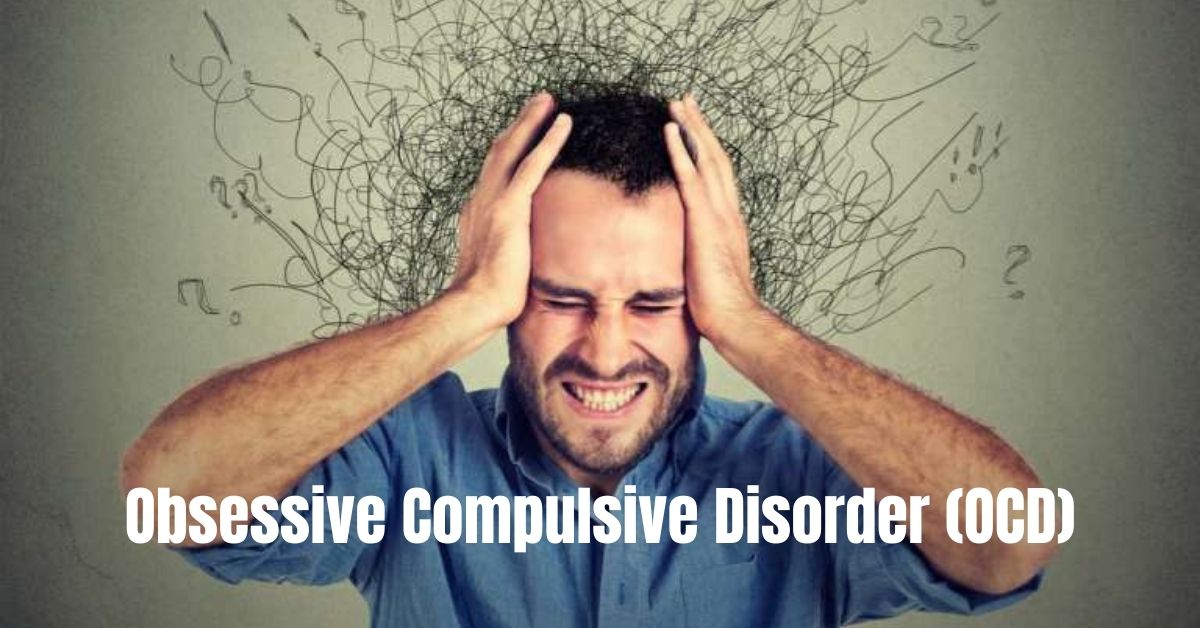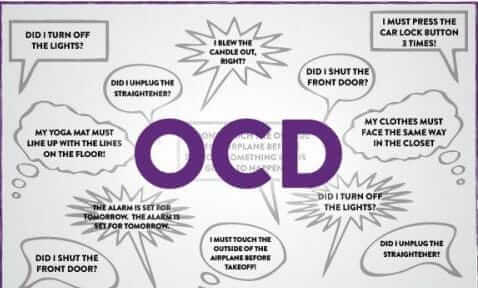Obsessive Compulsive Disorder (OCD)

OCD Stands for Obsessive Compulsive Disorder It is an anxiety disorder in which a person experiences recurring unwanted thoughts and feels compelled to perform uncontrollable and repetitive behavior. The person may distinguish that obsessive thinking and compulsive behaviors are irrational but feel unable to oppose them.
And the brain is stuck on a particular thought. If a person has an OCD patient he checks his hand again and again that his hand is not clean then he cleans his hand again and again Till when he doesn’t come out of this thought.
In other words, we can say that OCD (Obsessive Compulsive Disorder) is a small part of the mentality. Because in mental cases a person is mental by its brain. But the OCD person is mental but not completely. Or we can say that the person has the first stage of the mental cases. Because in the OCD (Obsessive compulsive disorder) person in mind but not totally.
OCD (Obsessive compulsive disorder) is not about the habit. Like biting your nails, thinking negative thoughts. Or obsessive thought might be certain numbers of colors are good or bad. Compulsives are a habit to wash your hands 5 to 10 times a day. And when you touch anything then you think that your hand is dirty. And the person thinks that he is powerless.
And everyone has to repeat and think about thought. But OCD (Obsessive compulsive disorder) person has to do action on them. Like
- Take up at least one hour a day.
- Are beyond your control.
- They aren’t enjoyable.
- Interface with work in your social life and other life.
Definition of Obsessive Compulsive Disorder

Obsessive compulsion disorder is a mental health issue in which a patient is obsessed with doing a particular thing again and again repeated that is called compulsive. They have certain thoughts of doing something repeatedly.
The patient has very little control over his thoughts as there are certain sensations and feeling occurs to anything repeatedly. For example, a person can have a thought of cleaning their homes again, checking if the door is locked or not again and again, and so on.
Well, the cause is quite unknown. It can happen due to genetic issues. It might be inherited from the parents. This issue can create a negative impact on their daily life. Also, in some cases, it can be dangerous for the people who are around the people.
Well, according to a study, it is found that about 2.3 percent of people get affected by this issue at some point in life. Also, it has been found that generally people get affected by this issue after the age of 35. But luckily we have the medication for this particular issue. So no need to worry as we gonna clear all those doubts in this particular frame of time.
Obsessive Compulsive Disorder Symptoms
OCD (Obsessive compulsive disorder) comes in many forms but most cases fail into at least one of four general categories.
Checking
checking means the OCD patient looks at the alarm system, ovens, or light switches or thinks you have a medical condition like pregnancy and schizophrenia.
Contamination
A fear of things that might be dirty or a compulsion to clean. Mental containment involves feeling like you have been treated like dirt.
In contamination, the OCD person thinks that he is dirty. Or he needs to clean himself. And OCD people feel things like you which type you treated with the dirty things and when you are dirty and you think to clean yourself. The same type of feelings is felt by an OCD person.
Symmetry and order
They need to have a thin lineup in a certain way. That means the OCD (Obsessive compulsive disorder) person has to do things until he is satisfied. This means an OCD person has done work again and again. They have no limit to doing any work. Like one to 10 times or more times.
Ruminations and intrusive thoughts
Obsessions with a line of thoughts. Some of these thoughts might be violent and disturbing. Sometimes they can be harmful to others
Obsessions and Compulsions
Many people who are positive with OCD (Obsessive compulsive disorder) they and their habits and thoughts don’t make sense. They enjoyed your life and they didn’t quit. And if they quit and stop then they feel bad and they start again.
Obsessive thought can include
- Worries about yourself or other pupils getting hurt.
- Constant awareness of blinking, breathing, or other body sensation.
- A suspicion that a partner is unfaithful, with no reason to believe it
Compulsive habits
Compulsive habits include the number of workers. Few are described here.
- Doing a certain work again and again. Every time or certain “good number” of times
- Needing to count things like steps and bottles.
- Fear of touching doorknobs, and using public toilets, or shaking hands.
Compulsions

Compulsions are excessive, repetitive, purposeful behaviors that affected people feel to must do to prevent and reduce the social anxiety or the Generalized anxiety cases by their obsessive thought or to neutralize their obsessions example are :
- Washing
- Checking
- Counting
- Ordering
The degree of insight varies most people with OCD recognized to the same degree that the beliefs underlying their obsessions are not realistic. However occasionally. Insight is completely lacking and patients are convinced that the beliefs of their obsessions are true and their compulsions are reasonable.
Because people with this disease may fear embarrassment stigmatics they often hide their obsessions and ritual relationships may be disturbing and performance at work or in school may decline. Depression is a measured common secondary feature.
Some people with OCD can also become a patient of tic disorder. However, motor tics are very unexpected, repetitive actions, briefs, such as blinking of an eye and similar other eye movements, shoulder shrugging, facial grimacing, and shoulder or head jerking. Some of the common vocal tics also include sniffing, grunting sounds, and repetitive throat-clearing actions.
Although symptoms can appear and then stop appearing, sometimes they can ease over time, or even worsen. Therefore people with OCD problems must try to help on their own. They can do so by ignoring all such situations that trigger their attractions. Also, they can use drugs or alcohol to calm themselves.
However, most adults with OCD problems can realize that what they are doing currently does not make any sense. But most children and some adults can not recognize that their behavior is out of control and not ordinary. Besides that, teachers or parents most probably recognize the OCD symptoms in the children.
Obsessive Compulsive Disorder Symptoms
Common Obsessions in OCD may include the Contamination includes Body fluids for example urine, feces. Also, Germs or diseases such as herpes, HIV. And Environmental contaminants Such as asbestos, radiation. Also, Household chemicals for examples: cleaners, solvents, and Dirt
Losing Control includes the Fear of some conditions such as acting on an impulse to harm oneself, and acting on an impulse to harm others, and violent or horrific images in one’s mind, and blurting out obscenities or insults, and Fear of stealing things.
Harm or fear of being responsible for something terrible happening (examples: fire, burglary). Fear of harming others because of not being careful enough (example: dropping something on the ground that might cause someone to slip and hurt him/herself)
Obsessions Related to Perfectionism such as Concern about evenness or exactness, The concern with a need to know or remember, Fear of losing or forgetting important information when throwing something out, Inability to decide whether to keep or to discard things, Fear of losing things
Unwanted Sexual Thoughts such as Forbidden or perverse sexual thoughts or images, Forbidden or perverse sexual impulses about others, Obsessions about sexual orientation. Sexual obsessions that involve children or incest, Obsessions about aggressive sexual behavior towards others.
Religious Obsessions (Scrupulosity) such as The concern with offending God, or concern about blasphemy, Excessive concern with right/wrong or morality,
Other Obsessions may include The concern with getting a physical illness or disease (not by contamination, e.g. cancer). Superstitious ideas about lucky/unlucky numbers in certain colors.
Compulsions are the second part of Obsessive compulsive disorder. These are repetitive behaviors or thoughts that a person uses intending to neutralize, counteract, or making their obsessions go away. People with OCD realize this is only a temporary solution.
Causes of Obsessive Compulsive Disorder & Risk Factor
In the cases of OCD (Obsessive compulsive disorder), doctors are not sure. Stress can make symptoms worse. It’s a bit more common in women than in men Symptoms often in teens or young adults.
However the causes of OCD problems are unknown, but the risk factors may include the following:
Environment Effect
Well, some type of association between obsessive-compulsive symptoms and childhood trauma has been described in some earlier studies. However, some more research is very much required to better understand this complete relationship.
Besides that, in some circumstances, children can be acquired OCD problems or other kinds of OCD symptoms following a streptococcal infection. Although this is named PANDAS (Pediatric Autoimmune Neuropsychiatric Disorders Associated) with Streptococcal Infections.
Brain Functioning and Structure
The imaging studies of the brain have shown discrepancies in the frontal cortex of the brain and subcortical structures of the brain in patients with OCD problems. Because there seems to be a connection between the abnormalities and OCD symptoms in specific areas of the brain.
But the main thing is that the connection is not so much clear. Therefore the research is still underway to understand the causes of OCD problems. So that it will help to determine the specific, and some personalized treatments to treat the OCD problems.
Genetics
Well, genetics or heredity can also be a big reason behind OCD problems. Because Twin and family studies have revealed that all those people with first-degree relatives such as a sibling, parent, or child, etc who have OCD problems, are at a higher risk for acquiring OCD themselves.
Because the risk is very high when the first-degree relative developed OCD symptoms as a child or just a teenager. However, some ongoing research continues to investigate the connection between OCD and genetics. Also, it can help to improve the diagnosis of OCD and its treatment too.
Other OCD (Obsessive compulsive disorder) Risk factor
- A parent sibling or child with OCD (Obsessive compulsive disorder)
- Physical difference in a certain part of your brains
- Depression and anxiety
- A history of physical or sexual abuse as a child.
Sometimes it seems that a child might have OCD after a streptococcal infection. This is called pediatric autoimmune neuropsychiatric disorder associated with streptococcal infections or pandas.
Some Related Conditions of OCD
Besides that, some other conditions of OCD giving some more features of OCD problems which occurs more frequently in the family members of such OCD patients. These include some more unexpected problems.
For instance, hypochondriasis which is a preoccupation with physical illness, body dysmorphic disorder which is the preoccupation with imagined ugliness, trichotillomania is known as hair pulling. Also, some eating dysfunctions such as binge eating disorder, and neurologically based dysfunctions such as Tourette’s syndrome.
- Skin-Picking Disorder (Excoriation)
- Hoarding Disorder
- Hair-Pulling Disorder (Trichotillomania)
- Body Dysmorphic Disorder
Severity may vary
OCD problems usually occur in the teen or young adult years, but they can start in childhood. The symptoms of OCD usually begin gradually and tend to vary in hardness throughout life. The types of obsessions and compulsions you feel can also change over time.
Symptoms generally worsen when you feel greater stress. OCD, normally considered a lifelong dysfunction, can have mild to moderate indications or be so severe and time-consuming that it becomes disabling.
When to see a Doctor During OCD
Well, there is a discrepancy between being a perfectionist. Because it’s someone who needs flawless performance of results for illustration about having OCD problems. OCD thoughts aren’t simply unnecessary worries about real problems in your life or like to have things clean or managed in a particular way.
If the problem of obsessions and compulsions disorder is affecting the quality of your life, then it is the right time to see your doctor or mental health professional.
Complications of OCD
Well, all such problems that are resulting from Obsessive compulsive disorder can incorporate the following among others:
- Difficulty attending work, school, or social activities
- Excessive time spent engaging in ritualistic behaviors
- Suicidal thoughts and behavior
- Troubled relationships
- Overall poor quality of life
- Health issues, such as contact dermatitis from frequent hand-washing
Diagnosis Of Obsessive Compulsive Disorder
Your doctor has to do a physical exam and blood test to make sure something else is not causing symptoms. They will also talk with you about your thoughts, habits, and feelings.
Diagnosis of Obsessive compulsive disorder disease is clinical, based on the presence of obsessions, compulsions, or both. The obsessions or compulsions must be time-consuming or cause clinically significant distress or impairment of functioning.
OCD (Obsessive compulsive disorder) Related conditions
Some separate conditions are similar to OCD (Obsessive compulsive disorder). They involve obsessions we think like.
- Your looks
- Collecting arranging or ordering things
- Pulling out eating your hair
- Picking at your skin physical illness
- Body order or how to you smile
Obsessive Compulsive Disorder Treatment

OCD (Obsessive compulsive disorder) has the following types of treatment.
- Therapies
- Mediations
1. Therapies
In therapies have done many types few types of therapies are given here
Support group:- A Form for Counselling and sharing experiences among people with similar conditions or goals. Such as depression and weight loss.
Cognitive-behavioral therapy:- A talk therapy focusing on modifying negative thought behaviors and emotional responses associations with psychological distress.
Psychoeducation:- Education about mental health that also serves to validate and empower patients.
Rational emotive behavior therapy:- Psychological treatments that help people change negative irrational thoughts and improve emotional well-being.
Exposure and response prevention:- A talk therapy based on exposing and feared or traumatic experience with a safe setting to help reduce any associated psychological distress.
Psychotherapy:- Treatment of mental and behavioral or disorder through talk therapy.
Systematic desensitization:- Psychological treatment that has people overcome fears by gradually exposing them to the thing they are afraid of.
Group psychotherapy:- Talk therapy where the therapist works with clients in a group instead of one-on-one.
Psychotherapy:- Cognitive behavioral therapy can help change your thinking pattern. It is called exposure and response prevention. Your doctor will put you in a situation designed to create anxiety or a set of compulsions. You learn the lesson and then stop your cold thoughts and actions.
Relaxations:- Simple things like meditation yoga and messages can help with stress full OCD symptoms.
2. Medications
Psychiatric drugs called selective serotonin Reuptake inhibitors helps many peoples control obsessions and compulsions they might take 2 to 4 month to start working common one include Citalopram, escitalopram, fluoxetine, fluvoxamine, paroxetine, and sertraline. If you still have symptoms your doctor might give you antipsychotic drugs like aripiprazole or risperidone.
Neuro Modulations:- in rare cases when therapy and medication are not making enough of a difference. Your doctor may discuss with your devices that can change the electrical activity in a certain area of your brain. One Kind of Transcranial magnetic stimulation is FDA Approved for OCD treatment it uses a magnetic field to stimulate never to sell. A more complicated procedure is deep brain stimulation electrodes that are implemented in your head.
OCD (Obsessive compulsive disorder) Directory:- Obsessive compulsive disorder is an anxiety order in which a person has repeated behavior or rituals.
Examples:- most examples of the OCD is QKI Movies or Humshakals movies.
In the Kyonki movie, Salman Khan is an OCD patient that has behaved like a normal man. And when doctors arrange the interview with Salman Khan in the movie. Salman Khan has completed his interview and after completing her interview doctors said that he is normal he is no need for the Mediterrane and then Salman Khan shows a fly then he destroyed the hospital property till he did not kill the fly and then doctors agree to admit Salman Khan for treatment. But after OCD, Salman Khan helps all the patients.




Write a comment
Your email address will not be published. All fields are required